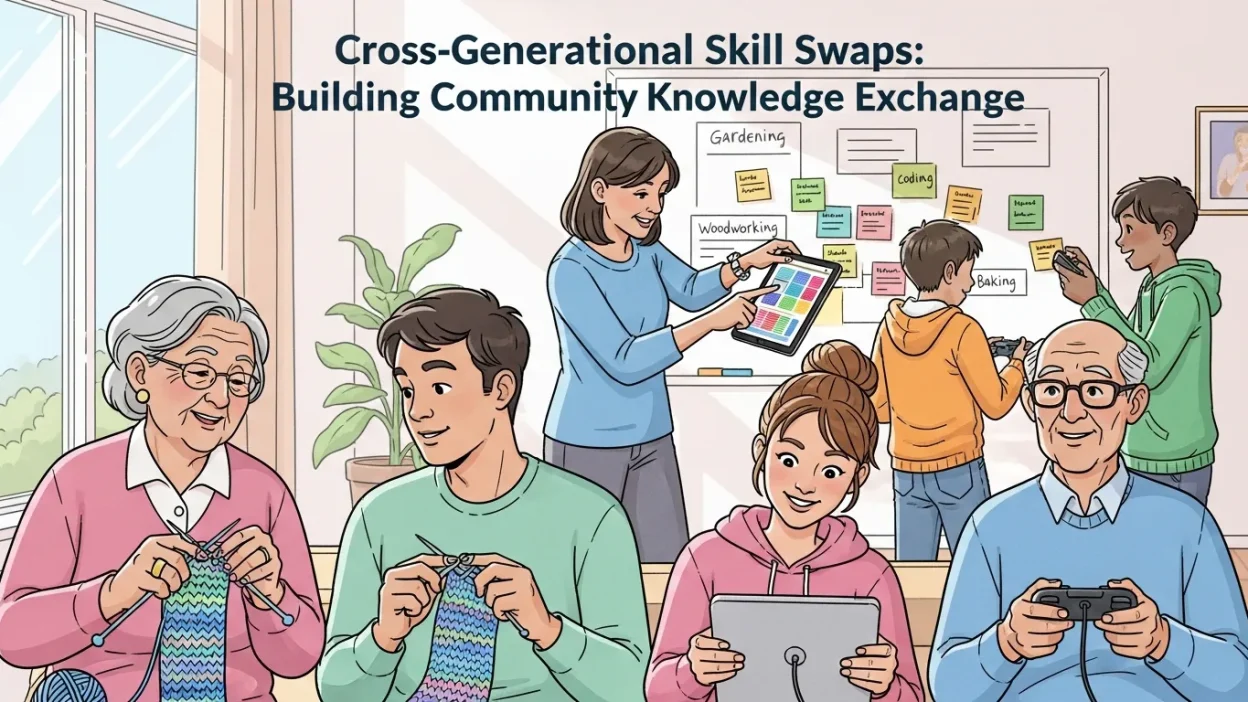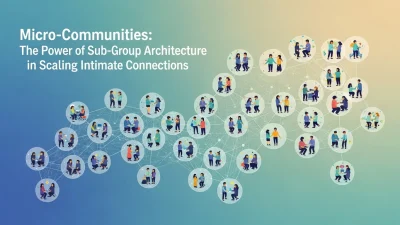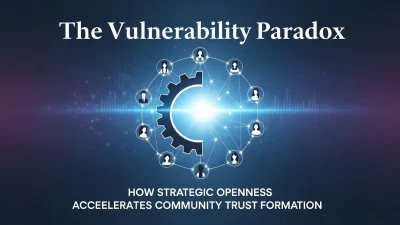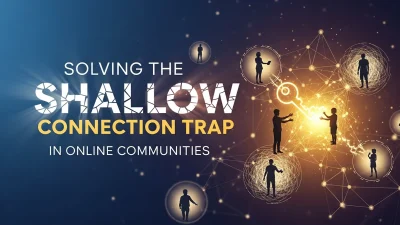Cross-generational skill swaps bring together people of different ages to teach, learn, and share knowledge. Seniors pass on traditional skills like crafts or trades, while younger participants teach digital tools, technology, or modern practices. These programs build mutual respect, strengthen community bonds, reduce social isolation, and foster empathy across generations. By creating intentional spaces for reciprocal learning, communities preserve valuable knowledge while encouraging engagement, collaboration, and cultural continuity.
In today’s rapidly changing world, communities often struggle with generational divides. Young people explore new technologies while older generations hold valuable traditional skills that risk being lost. The beauty of cross-generational skill swaps lies in their ability to bridge these gaps, creating meaningful connections while preserving and sharing knowledge.
What Are Cross-Generational Skill Swaps?
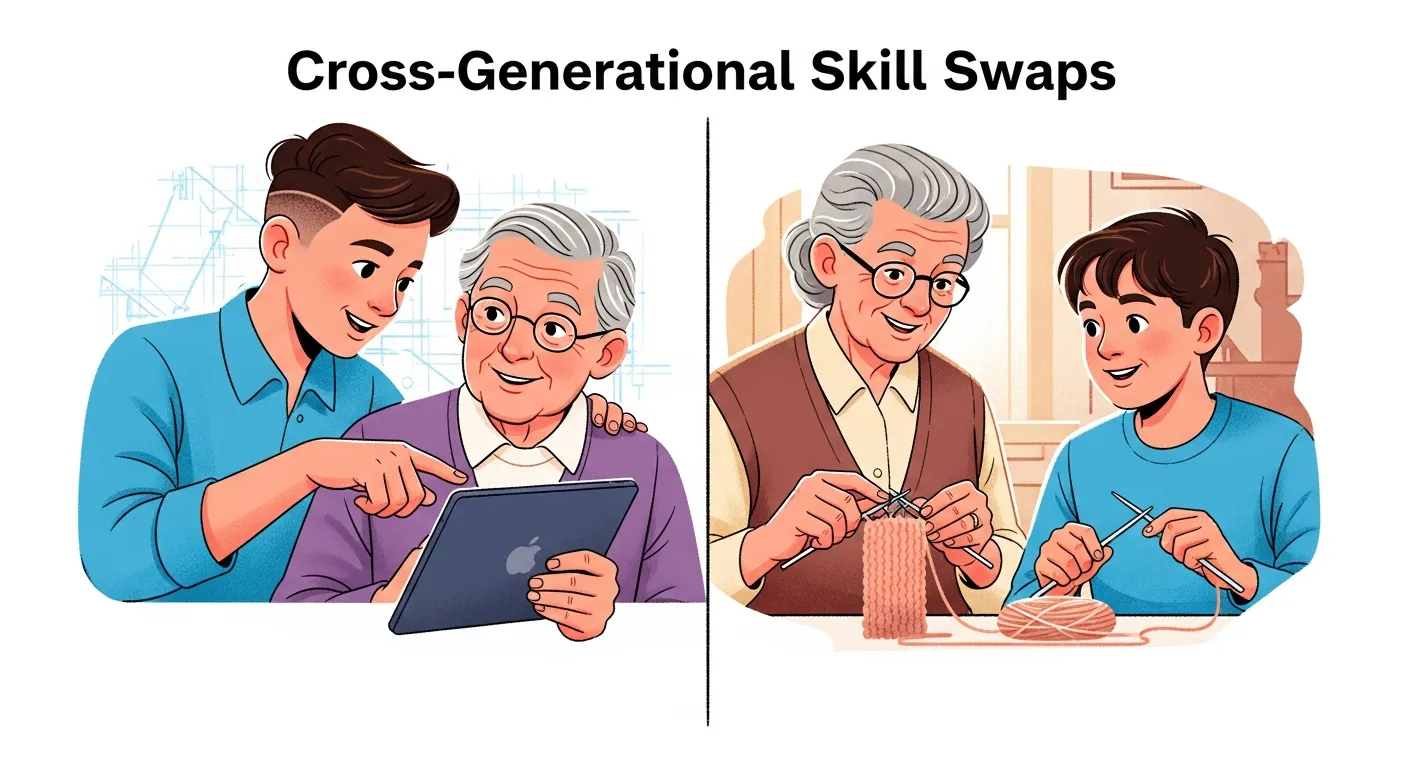
Cross-generational skill swaps create spaces where people of different ages come together to teach and learn from one another. These exchanges recognize that everyone has something valuable to offer, regardless of age.
When a retired carpenter teaches woodworking to college students while learning smartphone navigation from them, both parties gain practical skills and form unexpected bonds. These interactions foster mutual respect and understanding between generations that might otherwise rarely interact meaningfully.
Why Cross-Generational Skill Swaps Matter
Skill swaps aren’t just about learning techniques—they’re about connection, empathy, and community resilience. By facilitating exchanges between age groups, communities can:
- Preserve traditional knowledge while adopting modern skills
- Foster intergenerational respect and understanding
- Reduce social isolation among older participants
- Encourage youth engagement in civic and cultural activities
When people share expertise, they also share perspective. This mutual respect strengthens the social fabric and creates bonds that last beyond the classroom or workshop.
Cross-Generational Skill Swaps: Bridging Generations Through Learning
In today’s rapidly evolving world, generational gaps can prevent valuable knowledge from passing on. Cross-generational skill swaps bridge these gaps by creating opportunities for young and old to learn from one another. These programs not only teach practical skills but also strengthen empathy, understanding, and community resilience.
Such exchanges transform communities by fostering mutual respect. When older participants share traditional skills and younger participants teach modern technologies, both groups gain insight, practical knowledge, and meaningful connections that go beyond the classroom or workshop.
Benefits That Extend Beyond Skills
The Asymmetrical Value Exchange goes far deeper than the skills themselves. When generations connect, communities strengthen in numerous ways.
Younger participants often gain patience, perspective, and appreciation for traditional methods. They connect with their cultural heritage through hands-on learning experiences. For older participants, teaching valued skills validates their knowledge while keeping them engaged and mentally active.
Social isolation, particularly among seniors, diminishes as these programs create regular opportunities for connection. Meanwhile, negative stereotypes about different age groups fade through personal relationships built on mutual respect.
Types of Cross-Generational Skill Swaps
Skill swaps can be designed to serve a variety of purposes. Understanding the types helps organizers tailor programs effectively.
- Traditional-to-Digital Exchanges: Seniors teach handicrafts, gardening, cooking, or trade skills; youth teach digital tools, coding, or social media literacy
- Professional Mentorship Swaps: Retired professionals mentor students or young entrepreneurs while learning emerging trends in technology or business
- Community Enrichment Sessions: Mixed-age groups collaborate on projects like community gardening, art installations, or local history preservation
Each type emphasizes reciprocal learning and ensures every participant feels valued.
Success Stories From Around the World

In Japan, programs bringing together seniors and young professionals have revitalized traditional crafts while helping older artisans adapt to modern markets. Some European community centers host weekly skill swap sessions where teenagers teach digital skills while learning cooking, gardening, or home repairs in return.
Right here in our community, the Build Bonding initiative has created frameworks for sustainable skill exchanges that adapt to community needs.
Practical Tips for Organizing Skill Swaps
Launching a skill swap program doesn’t require massive resources. Key factors for success include:
-
Surveying the community to identify skills participants can teach and want to learn
-
Choosing accessible and comfortable venues
-
Establishing clear schedules and communication channels
-
Providing recognition and showcasing participant achievements
Simple planning can turn a small gathering into a thriving, sustainable learning network.
Starting Your Own Cross-Generational Skill Swap Program
Creating a cross-generational skill swap program doesn’t have to be complicated or resource-intensive. With thoughtful planning and intentional design, even small community spaces can host meaningful exchanges that foster learning, connection, and mutual respect between generations. Community centers, libraries, schools, and religious institutions often provide ideal venues, while virtual platforms can enable remote participation and broaden access.
The most successful programs begin with listening to your community. Survey members to identify the skills they want to learn and those they can offer. This ensures that the program meets real needs and leverages the unique expertise within your community.
Once skills are mapped, focus on creating comfortable and accessible spaces where participants feel safe to share and learn. Consider physical accessibility for seniors or younger participants and ensure technology or tools are available as needed. A welcoming environment encourages engagement and reduces anxiety about participating.
Clear communication channels are essential. Share schedules, expectations, and program guidelines ahead of time. Establish a system for registration, updates, or follow-ups, whether via email, messaging apps, or community notice boards. Clarity ensures smooth operations and minimizes confusion.
Recognition and celebration play a key role in sustaining participation. Showcase achievements, completed projects, or notable contributions in newsletters, social media, or community events. This reinforces the value of participation, motivates others to join, and strengthens the sense of accomplishment and belonging.
Finally, consider documenting the knowledge shared during sessions. Photos, recordings, manuals, or guides can preserve skills for future generations and provide reference material for new participants. This archival approach turns each skill swap into a lasting community resource.
By following these steps—surveying needs, creating welcoming spaces, communicating clearly, celebrating achievements, and preserving knowledge—organizers can cultivate thriving, sustainable cross-generational skill swap programs that enrich both individuals and the broader community.
Challenges and How to Overcome Them
Cross-generational programs can face hurdles, but they can be managed with foresight:
- Anxiety or intimidation: Icebreakers and structured activities ease participation
- Transportation issues: Carpooling, public transit coordination, or central locations solve access problems
- Communication gaps: Facilitators can establish shared vocabulary and set expectations to reduce friction
Awareness of these challenges ensures smoother, more enjoyable exchanges for everyone.
Overcoming Common Challenges
Some participants may initially feel anxious about teaching or learning across generational lines. Structured icebreakers and clearly defined activities help ease this tension. Transportation barriers for older or younger participants without drivers’ licenses can be addressed through carpooling arrangements or selecting centrally located venues.
Differences in communication styles sometimes create friction, but skilled facilitators can help bridge these gaps by establishing shared vocabulary and expectations from the beginning.
The Future of Community Building
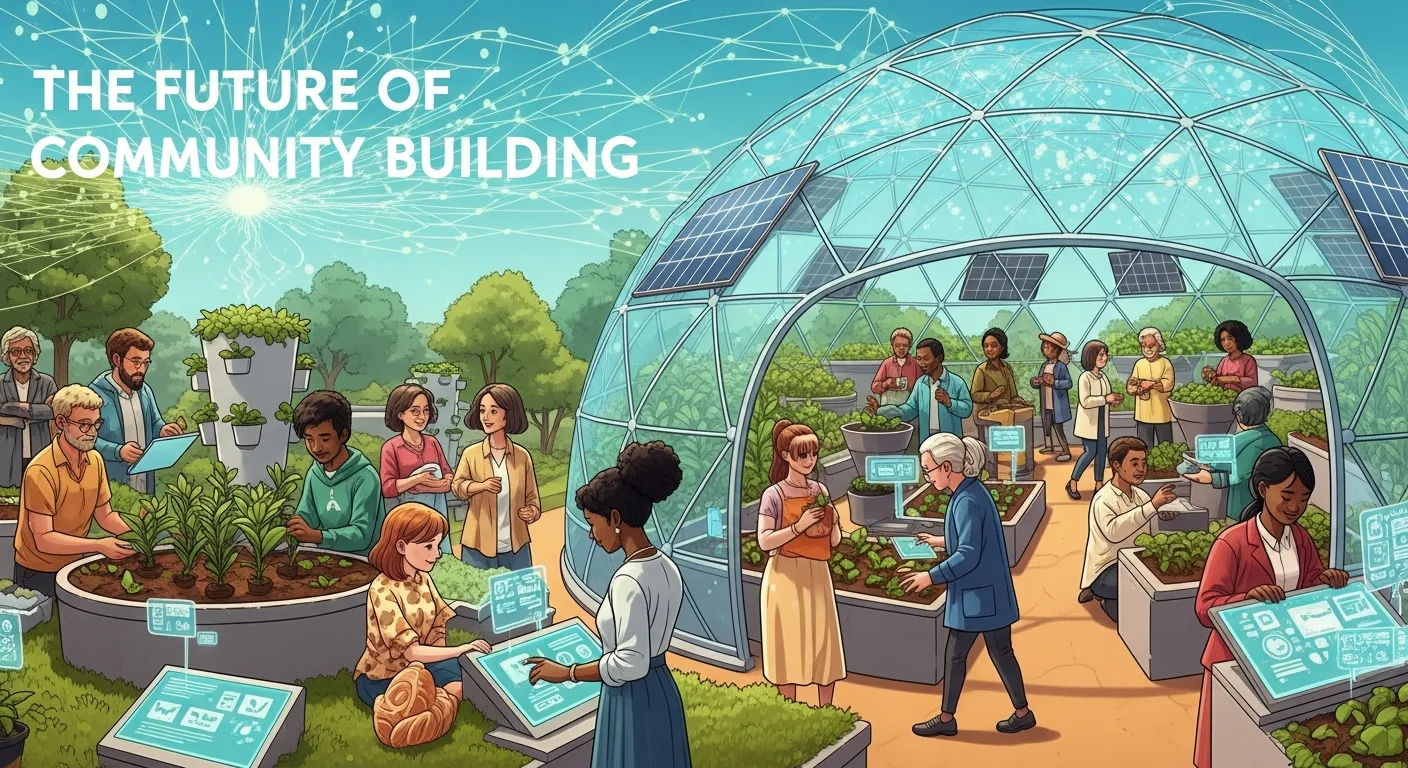
In today’s increasingly age-segregated society, fostering intentional cross-generational connections is not just valuable—it’s essential. Communities that actively encourage interactions between younger and older members create resilient, adaptable networks capable of navigating change while preserving and sharing valuable knowledge, skills, and traditions. These connections help ensure that important cultural practices, professional expertise, and life skills are passed on, while also introducing fresh perspectives and innovation.
Cross-generational exchanges benefit everyone involved. Younger participants gain insight into historical practices, patience, and mentorship from experienced community members. Older participants benefit from learning new technologies, staying socially and mentally active, and feeling valued for their contributions. Together, these interactions build empathy, mutual respect, and stronger social cohesion.
The power of cross-generational skill swaps lies not only in the knowledge shared but in the relationships and trust formed during the process. A single workshop or mentorship session can spark meaningful collaborations, lifelong friendships, or community initiatives that ripple outward. Communities that embrace this model become more vibrant, cohesive, and prepared to face challenges collectively.
Every skill swap, no matter how small, contributes to a larger culture of lifelong learning, inclusion, and collaboration. So the next time you find yourself with a skill to teach—or an opportunity to learn—consider reaching across generational lines. The connections you build may surprise you with their depth, offering experiences that extend far beyond the classroom, workshop, or digital platform.
Imagine a community where seniors mentor budding entrepreneurs, teens teach digital literacy to retirees, and traditional crafts are kept alive alongside modern innovations. In such a community, knowledge flows freely, relationships deepen, and the social fabric grows stronger with every interaction.
What skills would you share in a cross-generational exchange? From coding to cooking, woodworking to wellness practices, each exchange has the potential to bridge generational gaps, create mutual respect, and strengthen the fabric of our communities for generations to come. The future of community building is one where age becomes an asset, not a barrier, and where collaboration across generations fosters resilient, connected, and thriving communities.
Measuring the Impact of Cross-Generational Skill Swaps
Evaluating skill swap programs ensures long-term sustainability. Metrics to consider:
| Metric | What It Shows |
|---|---|
| Participant Retention | Indicates engagement and satisfaction |
| Number of Skills Exchanged | Reflects learning breadth |
| Frequency of Interaction | Measures ongoing connection |
| Participant Feedback | Captures emotional and social impact |
| New Initiatives | Shows inspiration and community growth |
These metrics focus on relationships and outcomes—not just attendance.Learn More Measuring Community Success
Why These Programs Strengthen Communities
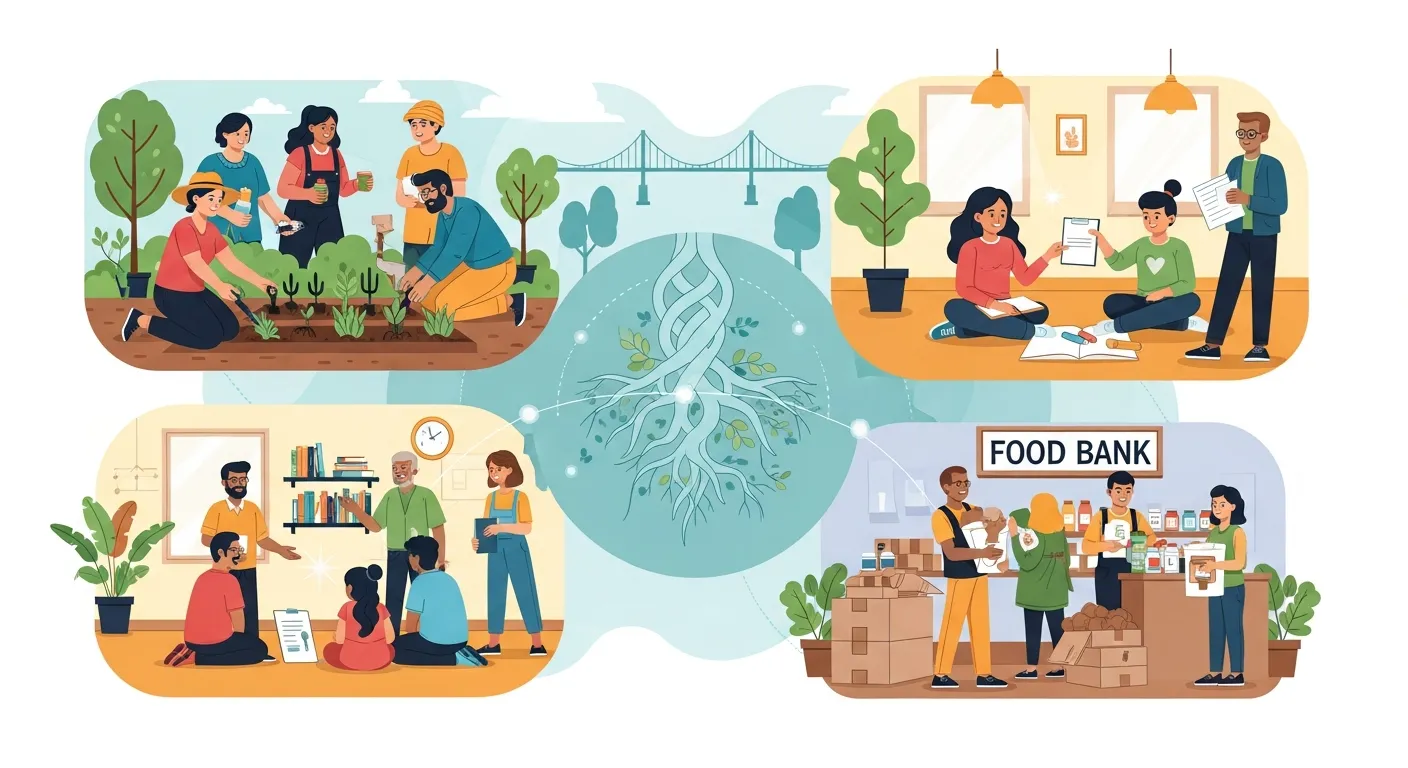
Cross-generational skill swaps go far beyond individual learning—they help build ecosystems of mutual respect, understanding, and resilience within communities. By creating structured opportunities for people of different ages to teach and learn from one another, these programs foster meaningful connections that extend well beyond the sessions themselves.
Communities benefit in multiple ways:
- Knowledge Preservation: Valuable traditional skills, crafts, and cultural practices are passed down, ensuring they are not lost to future generations.
- Mutual Value and Recognition: Both youth and seniors feel seen, appreciated, and connected, enhancing self-worth and community engagement.
- Stronger Social Cohesion: Regular interaction across age groups breaks down generational stereotypes, fostering empathy and cooperation.
- Collaborative Growth: Shared experiences cultivate trust and teamwork, encouraging members to work together on broader community initiatives and projects.
The long-term impact of these programs extends far beyond acquiring skills. They nurture a culture of lifelong learning, empathy, and intergenerational collaboration, creating communities that are not only more knowledgeable but also more resilient, supportive, and socially connected.
Conclusion
Cross-generational skill swaps are more than learning opportunities—they are community-strengthening initiatives that bridge age gaps and foster meaningful relationships. By valuing each participant’s expertise and encouraging reciprocal learning, these programs nurture respect, inclusivity, and intergenerational connection. Communities that implement skill swaps create lasting bonds, preserve traditions, and build resilient networks capable of thriving in a changing world.
Frequently Asked Questions (FAQs)
1. What is a cross-generational skill swap?
A cross-generational skill swap is a structured program where people from different age groups come together to teach, learn, and exchange knowledge and experiences. It encourages mutual learning, connection, and understanding between younger and older participants.
2. Why are skill swaps important?
Skill swaps preserve valuable traditional knowledge, promote modern digital and technical skills, strengthen social relationships, and reduce isolation. They also foster empathy and understanding between generations, helping communities remain resilient and connected.
3. Who can participate in these programs?
Participants can be of any age—students, young professionals, mid-career adults, retirees, and seniors. Everyone contributes unique skills and perspectives, creating a mutually beneficial learning environment.
4. What types of skills are exchanged?
Skills can range from traditional crafts, woodworking, cooking, and gardening to professional mentoring, digital literacy, coding, or social media expertise. The focus is on reciprocal learning where all participants gain something valuable.
5. How do skill swaps strengthen communities?
They foster mutual respect, trust, and collaboration. By connecting diverse generations, these programs increase social cohesion, encourage shared responsibility, and create supportive networks that extend beyond individual sessions.
6. What are the benefits for younger participants?
Younger participants gain practical life skills, cultural insights, patience, empathy, and guidance from experienced mentors. They also learn to value traditional knowledge while applying it alongside modern approaches.
7. What are the benefits for older participants?
Older participants stay mentally active, feel valued and engaged, learn new technologies, and reduce social isolation. They gain a sense of purpose by sharing their expertise while building meaningful relationships with younger generations.
8. Where can skill swaps take place?
Skill swaps can occur in community centers, libraries, schools, religious institutions, or digitally through virtual platforms. Flexible venues and online options make participation accessible to a wide range of individuals.
9. How do organizers measure success?
Success can be measured by participant retention rates, the number of skills exchanged, frequency of interaction, participant satisfaction and feedback, and new initiatives or collaborations that emerge from the program.
10. What challenges might arise?
Common challenges include initial anxiety or intimidation, transportation and accessibility issues, and differences in communication styles or expectations between age groups.
11. How can challenges be overcome?
Challenges can be addressed with structured icebreakers, clear facilitation, comfortable and accessible venues, communication guidelines, and thoughtful activity design that supports engagement for all participants.
12. Why are cross-generational skill swaps considered the future of community learning?
They foster sustainable, resilient communities by bridging generational gaps, passing down knowledge, strengthening social bonds, and cultivating lifelong learning and empathy across all ages.


